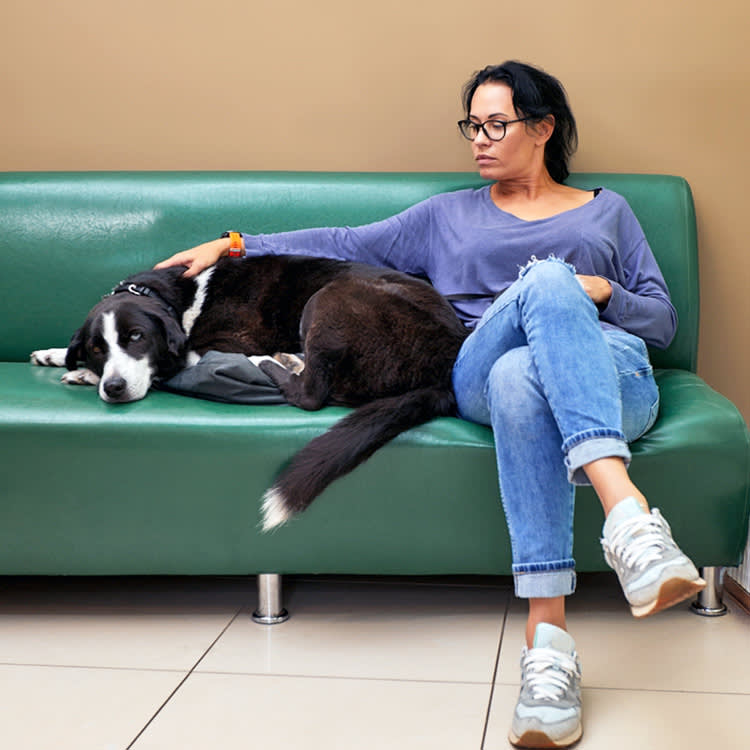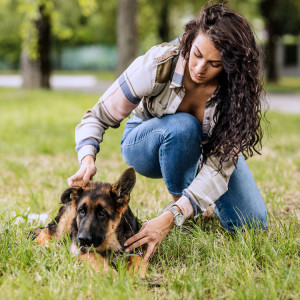My Dog Has Bloody Diarrhea: What to Do and Home Remedies
And when to visit your veterinarian.

Share Article
In This Article:
What Is Bloody Diarrhea in Dogs? What Are the Causes of Bloody Diarrhea in Dogs? When to Seek Emergency Vet Care What Can I Do at Home Before Visiting the Vet? How Does a Vet Diagnose Bloody Diarrhea in Dogs Treatment Options for Bloody Diarrhea in Dogs Frequently Asked Questions
Diarrhea is a common illness among dogs. It can be alarming if your dog suddenly comes down with it, but what if it’s also bloody? You may wonder what is causing it and how alarmed you should be. You may also wonder if you should treat it differently from diarrhea without blood. Should you call the veterinarian immediately or try to treat it at home? This guide answers these questions.
Main takeaways
Dogs can develop diarrhea that has blood in it.
There are several causes of bloody diarrhea, including dietary indiscretion, parasites, stress, tumors, and others.
If your dog with bloody diarrhea has other symptoms, such as vomiting, lethargy, and dehydration, you should seek veterinary care.
You can sometimes treat your dog’s bloody diarrhea at home, but it most often requires a veterinarian’s attention.
What is bloody diarrhea in dogs?
Just as the name implies, bloody diarrhea is loose or liquid stools with blood in them, usually occurring more frequently than usual. The blood can come from anywhere in the intestinal tract. If it’s bright red, it’s probably from the lower intestines, either the colon or rectum. If it’s dark black and tarry, it’s probably from higher up, either the esophagus, stomach, or small intestines. There could also be a small streak of blood on the stool, which may not be significant. It may be tiny broken blood vessels just from straining or even from the anal glands instead of the intestines.
How much do you spend on your pet per year?

What are the causes of bloody diarrhea in dogs?
Bloody diarrhea in dogs usually indicates irritation within the intestinal tract or a more serious intestinal or even systemic condition. There are many causes, some fairly benign and easily treated at home, while other more serious causes need a vet’s attention.
Diet
There are several different diet-related causes of diarrhea in dogs, including:
Sudden changes in diet
Food allergies
Food intolerances
Eating spoiled food, garbage, or table scraps
Swallowing a foreign object
Some cases of diarrhea, such as those in response to a sudden change in diet, may respond very well to home care, while others, including a swallowed toy or other foreign object, may need immediate veterinary care.
Infections
Dogs can get infections in their gastrointestinal system. Bacterial infections such as salmonella or campylobacter can cause bloody diarrhea. Viral infections, like parvovirus, can be dangerous, particularly in puppies. Fungal infections, including histoplasmosis, can also occur. The treatment for each type of infection is different, so it’s important to diagnose it properly.
Parasites
Most dogs go outdoors and can, therefore, encounter contaminated soil, water, or feces and become infected with parasites such as hookworms, whipworms, and giardia. Some can cause bloody diarrhea, and all parasites are unhealthy for your pet. Even dogs who receive regular deworming can contract parasites in between dewormings.
Toxins and poisoning
Dogs can also ingest toxic substances, including chemicals, plants, human medications, and rodent poisons. These can harm the intestinal lining, leading to bloody diarrhea. They can also cause systemic illness, sometimes very severe, so if you suspect your pet may have ingested a toxin, see a vet right away.
Stress or anxiety
It may be surprising to learn that your playful pup or calm, loving senior can feel stressed or anxious. However, they certainly can. Dogs can be bothered by a change in environment, a new pet in the home, boarding, travel, moving, and a host of other events. Stress and anxiety can cause changes in cortisol levels, which, in turn, can disrupt the gut, leading to colitis and bloody diarrhea.
Underlying health conditions
Diarrhea in dogs can result from chronic conditions such as inflammatory bowel disease, pancreatitis, or cancer. Dogs can also have clotting disorders that can lead to blood in the stool. In addition, systemic diseases such as diabetes, kidney disease, and liver disease can cause diarrhea in dogs. You will need a veterinarian to diagnose conditions such as these.
When to seek emergency vet care
If your dog has diarrhea with blood in it and other symptoms of illness, you need to seek veterinary help immediately. These symptoms include:
Lethargy
Vomiting
Anorexia
Signs of dehydration (e.g., dry gums, sunken eyes, skin that doesn’t spring back when pinched)
Dark, tarry blood or bright red blood which may indicate internal bleeding
What can I do at home before visiting the vet?
If there is just a small streak of blood in your dog’s stool or there’s just one episode of bloody diarrhea, you can try home care, but only do so if your pup is showing no other symptoms. Here’s what to do:
Do a complete assessment of your dog’s status. Ensure there are no symptoms other than bloody diarrhea.
Withhold food for 24 hours, but ensure fresh water is always available.
After the fasting period, if your dog is still stable and is drinking, offer a bland diet of chicken and white rice. Do not add any seasonings.
Begin using an over-the-counter dog-specific probiotic to help restore gut balance.
Monitor closely and seek veterinary care if symptoms worsen or persist beyond 24 to 48 hours.
Anytime there is blood in your dog’s stool, you should at least call your vet, but if all else is well, they may agree with the above plan.
How does a vet diagnose bloody diarrhea?
A veterinarian will take a detailed history, perform a thorough examination, and, depending on the history and exam results, recommend tests, including fecal tests, possible blood work, and X-rays.
A fecal sample tests for parasites and viral or bacterial infections.
Blood work will test for organ dysfunction, such as diabetes, liver disease, and kidney disease, as well as hydration status and clotting ability.
If an obstruction, tumor, or other abnormality is suspected, additional tests such as X-rays and ultrasounds may be recommended.
If your vet readily obtains a diagnosis, such as a positive test for parasites, the fecal exam and treatment may be all that is necessary. If the fecal exam is negative, they will make additional recommendations.
Treatment options for bloody diarrhea in dogs
Depending on the results of the exam and any tests, your vet will recommend home care or hospital care.
Home remedies for bloody diarrhea
For mild cases, vets may recommend:
Hydration with fresh water
Fasting for 24 hours
A bland diet of chicken and white rice
Probiotics to improve gut health
Adding fiber (canned pumpkin) to firm up stools.
Many cases of diarrhea, even bloody diarrhea, clear up within a few days with the above treatments.
Standard medical treatments for bloody diarrhea
More severe cases of bloody diarrhea may require medications, IV fluids, and even hospitalization. In the case of an obstruction or the need for an exploratory or biopsy, your vet may recommend surgery. Here are the possible treatments and the reasons for them:
Medications such as antibiotics, anti-parasitics, or anti-inflammatory drugs may be prescribed if an infection, parasites, or inflammation is found.
IV fluids may be given if your dog is too dehydrated to just rely on water.
Keeping your dog in the hospital may be recommended for more severe conditions or when continuous fluid therapy is necessary.
Surgery may be necessary for blockages, tumors, or severe GI damage.
FAQs
Is bloody diarrhea always an emergency in dogs?
Not always, but it should be carefully assessed, and pet parents should look for additional symptoms. If there are other symptoms or your dog becomes dehydrated, then you should involve the vet. If there are no symptoms other than diarrhea and your dog is drinking well, you may opt to treat at home. If you decide to treat the diarrhea at home for 24 hours, your dog should be monitored closely.
What does it mean if my dog is pooping blood but is acting normal?
If there are no other signs, bloody diarrhea can mean one of the milder causes may be the culprit. Food indiscretion, stress, or parasites are causes that can be addressed quickly.
What should I feed my dog if they have bloody diarrhea?
A period of fasting, followed by a bland diet of boiled lean protein and white rice or mashed potatoes, will usually calm your dog’s intestinal tract if there are no other symptoms. Adding an over-the-counter probiotic for dogs can also be helpful.
References
Ramos, Carolina Pantuzza, et al. “Enteric Organisms Detected in Feces of Dogs with Bloody Diarrhea: 45 Cases.” Topics in Companion Animal Medicine, vol. 45, Nov. 2021, p. 100549, https://doi.org/10.1016/j.tcam.2021.100549opens in new tab.
Skotnitzki, Elisabeth, et al. “Frequency of Signs of Chronic Gastrointestinal Disease in Dogs after an Episode of Acute Hemorrhagic Diarrhea.” Journal of Veterinary Internal Medicine, vol. 36, no. 1, 10 Dec. 2021, pp. 59–65, https://doi.org/10.1111/jvim.16312opens in new tab.
Unterer, Stefan, and Kathrin Busch. “Acute Hemorrhagic Diarrhea Syndrome in Dogs.” Veterinary Clinics of North America: Small Animal Practice, vol. 51, no. 1, Jan. 2021, pp. 79–92, https://doi.org/10.1016/j.cvsm.2020.09.007opens in new tab.
Volkmann, M., et al. “Chronic Diarrhea in Dogs - Retrospective Study in 136 Cases.” Journal of Veterinary Internal Medicine, vol. 31, no. 4, July 2017, pp. 1043–1055, https://doi.org/10.1111/jvim.14739opens in new tab.

Dr. Shelby Neely, DVM
Dr. Shelby Neely is a freelance writer and veterinarian who graduated from the University of Pennsylvania School of Veterinary Medicine and has practiced veterinary medicine for 30 years, specializing in small animals. Her work has appeared in Allivet, AsktheCatDoctor, WhiskerDocs, Ask the Cat Doctor Radio, Ask the Cat Doctor TV, and numerous other websites, brochures, newsletters, newspapers, and ebooks. In her spare time, Dr. Neely likes to spend time with her three children, two grandchildren, three cats, two grand-cats, and five grand-dogs.
Related articles
![feeding black dog rice water to help relieve diarrhea]()
Vet-Approved Diarrhea Treatments
Shudder. It happens to all of us.
What Can I Give My Dog for Diarrhea?
It’s not fun for anyone.
What Should You Feed a Dog With Diarrhea?
Keep it plain. Here’s why.
What Causes Diarrhea in Dogs?
It’s a poopy problem to have.
Can You Give Dogs Imodium?
And what else you can give your dog for diarrhea.
![Young woman comforting German Shepherd puppy outside.]()
My Dog Is Pooping Blood: What Should I Do?
It’s an alarming sight, but here’s what you should know.








